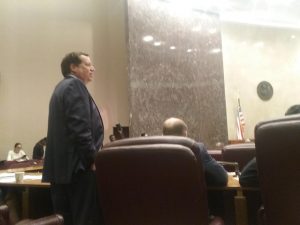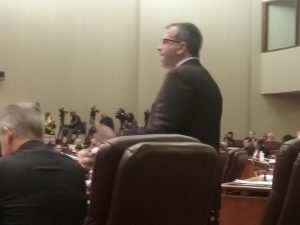Chicago looks for cost-savings with $3 billion bond sale
By Kevin Beese Staff Reporter — October 16, 2017
Chicago Ald. Joe Moore (49th Ward) talks in favor of the city issuing up to $3 billion in sales tax bonds at last week’s City Council meeting. (Photo by Kevin Beese/Chronicle Media)
Did Chicago aldermen make a move to pay down debt and free up money for city programs or did they simply kick the can further down the road for short-term gain?
It may take four decades to find out.
The City Council has authorized issuing up to $3 billion in sales tax bonds, taking advantage of recently passed state legislation that lets the city issue bonds tied to the sales tax it receives back from the state. Because the 30-year bonds, which can be extended to 40 years with council approval, would be tied to a guaranteed source of repayment — city sales-tax revenue coming back from the state — investors would be more likely to buy the bonds and that appeal could mean a better interest rate for repayment. City officials say the move could save millions in taxpayer dollars.
“We should not pay banks for higher interest rates,” Mayor Rahm Emanuel said. “All businesses have to do that. If you don’t have to pay a bank the hard-earned money of our constituents, I’d rather invest that in after-school programs, summer jobs and more police officers. I’m for police officers, after-school programs and jobs, not banks.”
Following an hour of discussion on the council floor last week, aldermen overwhelmingly backed the spending plan that officials said could lower the city’s interest rate for bond repayment by 2.5 percent points.
John Arena (45th Ward), one of five aldermen to vote against the spending plan, said that the city is putting all its faith in Wall Street to create the cost-savings for taxpayers.
“My distrust is on who we are asking to be rational and that entity is not rational. That’s the bond market. That’s the rating agency. That a word dropped here by the governor, that, ‘well, we should bankrupt (Chicago Public Schools)’ and lo and behold, CPS is paying extra interest even though there is not authority to do that,” Arena said. “We are saying that this irrational beast that we have the luxury of paying for their services to rate us poorly is the one that is going to act rationally.

Chicago Ald. John Arena (45th Ward) voted against a plan for the city to issue up to $3 billion in sales tax bonds. (Photo by Kevin Beese/Chronicle Media)
“That’s the rosy glow that’s being put on this. I sure hope so. And are they going to give us 2.5 percent or are they going to throw us a bone and give us a quarter percent and say, ‘Good day?’ They know we have to issue debt in order to run our city. What compels them to be rational here? Nothing. Nothing compels them to be rational. That’s where I have no trust.”
Besides Arena, other aldermen who voted against the measure in the 43-5 tally were: Leslie Hairston (5th Ward), David Moore (17th), Carols Ramirez-Rosa (35th) and Scott Waguespack (32nd).
Ald. Edward Burke (14th) recused himself from the vote, stating that he has represented banks — potential bond buyers — in his law practice.
Ald. Ariel Reboyras (30th) was absent.
Ramirez-Rosa likened the spending plan to the city’s recent selling of the rights to the parking meters “setting ourselves up for a long-term loss for a short-term gain.”
He said the city is setting up a $3 billion credit line, but losing $6 million per year in sales tax through the deal. The sales tax would go toward paying off the bonds.
“We can get better deals from Wall Street,” Ramirez-Rosa said. “Unfortunately, this ordinance doesn’t do it. It ensures that our public money will become a private asset.”
Ald. Jason Ervin (28th) said the bond issuance simply makes good sense for the city.
“Should we pay 2.5 percent more than we are going to pay on $3 billion?” Ervin said.
The alderman said the spending plan reminds him not of the parking deal, but the aggregation deal a couple of years ago when the city bought electricity for its residents at a lower rate.
“We have an opportunity to capture some savings, and again, this is a not a piece we have given up everything for,” Ervin said. “This is a specific means of revenue for a specific purpose. This is nothing more than a revenue bond.”
Read the current issue of the Cook County Chronicle
Free subscription to the digital edition of the Cook County Chronicle
— Chicago looks for cost-savings with $3 billion bond sale —



